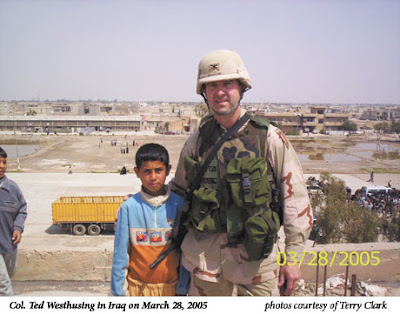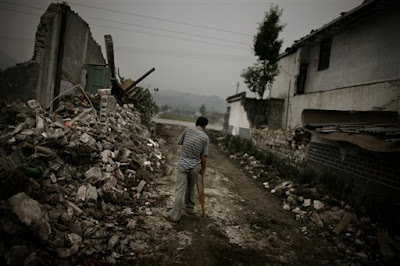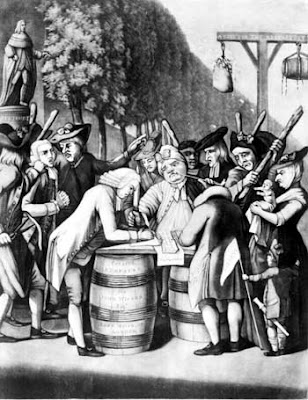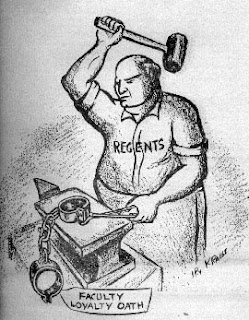Memorial Day is ours to honor our fallen.............
Ted's Ghost
The Death of Ted Westhusing Leaves a Widening Circle of Sorrow
by Tom Palaima
When the Greek hero Odysseus visits the Underworld in Book 11 of Homer's The Odyssey, he learns that his mother, Antikleia, who was alive when he set sail for Troy, has died and now dwells in the gloomy regions the Greeks called Hades. Odysseus sees her there and, overcome by sorrow, tries to embrace her. She slips away from his grasp but responds to his tearful pleas by explaining, "We no longer have sinews keeping the bones and flesh together, but once the life-force has departed from our bones ... the soul slips away like a dream." Cold comfort for the still-living and long-suffering Odysseus.
My friend, my former student, my scholarly collaborator Ted Westhusing is a ghost to me now. He is a ghost to his mother, his father, his brothers and sister, his wife and three children, his fellow soldiers, his former students at West Point Military Academy, and to the many people who wrote messages in his memorial guestbook (www.legacy.com/GB/GuestbookView.aspx?PersonId=14190695). We all want Ted, flesh and blood, self-effacing wit, plainspoken and honest, dedicated, moral, caring. We want to hear his laughter and feel the warmth of his hello, only matched in how good it made you feel, in my experience, by my late friend Clifford Antone's "Hey there, brother."
I want Ted, not his ghost. And I only knew Ted for three years. I feel the profound grief of his mother and family. Their loss seems to me unbearable, all the more because of the circumstances described so well in Robert Bryce's article (p.28).
In the online guestbook, Steve, an old friend of Ted's from Jenks High School in Oklahoma, writes, a year and a half after Ted's death, that "Ted always made us feel like we were someone special. ... Just the other day, I talked to my children about how important it is to look out for others. When my son was being bullied by a group at school, I talked about Ted and how he cared and looked out for others. It really made an impact on my son. Thanks Ted and God bless you and your family." Ted is somehow still alive in Steve's son.

Imagine the man Steve describes shouldering the overwhelming responsibility of training Iraqi security forces and doing so with no brothers-in-arms around him and, as his "suicide note" makes clear, without the support of his two commanders. One of them, with an irony right out of Joseph Heller's Catch-22, is Gen. David Petraeus, "Iraq's repairman," as Newsweek calls him.
Fierce Dedication
I teach ancient Greek and war and violence studies through the filter of ancient history. I knew Ted Westhusing in both these areas. Ted was 41 years old and a stellar Army officer of almost two decades when he came to UT-Austin in the summer of 2002 to study intensive Greek, five hours a day, five days a week. He needed Greek for his Ph.D. thesis, and he was taking it with graduate students and gifted undergraduates. He reminded me then of Col. Kurtz in Apocalypse Now, who went through Army Airborne School at age 38. Capt. Willard describes Kurtz's Westhusing-like experience in this way: "The next youngest guy in his class was half his age. They must have thought he was some far-out old man humping it over that course. I did it when I was 19, and it damn near wasted me. A tough motherfucker. He finished." As a description of how his fellow students viewed him, Ted would disagree only with the use of the word "motherfucker." I never heard him swear.
Ted was not a natural linguist. But he mastered Greek by long hours and hard work. He later described his experience in the UT alumni magazine, The Alcalde, as being harder than Army Airborne training.
Even in intensive Greek with so many hours of contact, memorable students are rare. The focus is on getting 20-25 students through historical linguistics and then assorted classical Greek literary genres. But Ted's achievement stayed with me. We stayed in touch despite our widely differing views on whether the American military should be in Iraq and Afghanistan.
Ted invited me up to West Point for five days to lecture to his cadet students on the nature of ancient Greek warfare and ancient Greek attitudes about the morality of warfare. He trusted that I would stay on message and not interject my strong views about Iraq and Afghanistan. I saw there the fierce dedication he had to his cadets and the respect bordering on awe they had for him. I also noticed how he had organized every detail of my five-day visit with scrupulous care.
Ted and I worked together on three other major projects. We were advisers to a Discovery Channel program on war in the Homeric epics. We wrote an article together for London's Times Higher Education Supplement on the value of studying Homer at West Point. And we both gave papers at a conference in St. Louis on the experience of war and the trauma it causes, from ancient Greece to the Iraq war. On all these projects, Ted's sense of values and his fierce belief in moral principles were conspicuous.
When Ted e-mailed me on Dec. 20, 2004, with what he called "twice good news" – that he had been selected for eventual promotion to colonel and had agreed to deploy to Iraq to serve under "a former boss of mine Lt. Gen. Petraeus" – I first responded in keeping with his own excitement about assisting in "the continuing effort to get the Iraqi security forces capable of killing the bad guys themselves and of securing their own country."
I expressed my pride in what he had achieved and my heartfelt good wishes. But later, I wrote that soldiers who had been writing me and sending me images of the effects of suicide-bomb blasts were not "optimistic" about the effectiveness of "Dumsfeld's" strategies. Ted's reply was strong. He felt there was no place for such attitudes and even requested the names and units of my informants. I declined in a way that let the matter drop, but that break stayed with us so that I did not communicate with Ted while he was in Iraq.
The Diameter of Death
I feel now that I let my friend down. Ted's death haunts me. His ghost sometimes flits close enough for me to feel. I have the cards from his memorial service that his mother sent me propped up in my study at home and at my computer in my office in Waggener Hall. It is much too easy to turn any dead soldier into whatever you want him or her to be. I want to remember who Ted really was.
In my opinion, it is good that Ted has become a symbol of the waste of this particular war. Those who want to defend the war can easily say that Ted's moral sensibilities were too inflexible and that war's moral ambiguities produce many shades of gray, while Ted saw things only in black and white. Those who want to condemn the war, as I do, can easily use Ted as a symbol for all that is wrong with our leadership and how this war is being waged. Those choices make dead soldiers into icons, and they also let us blame easy targets, Bush, Rumsfeld, Ted himself, and move on.
We should instead remember what Yehuda Amichai writes in his poem "The Diameter of the Bomb" about the death of a single young woman from a terrorist bomb. The grief from her death radiates outward to affect people on other continents and eventually involve the whole world in a circle of sorrow "with no end and no God."
The conditions of the Iraqi war enclosed Ted in a circle within which he could not feel the tender mercies of his God, nor the saving love of his family and friends. His death is a terrible waste. We should have more than the ghost of this good and honorable man for comfort.”
Colonel Westhusing found himself in a fight with the logic of capitalism and war profiteers. We always hear about the victims of Communism, millions in China and Russia who died for someone else’s utopia, but maybe we need a memorial for those Americans whose ideals got between a profiteer and his money. Theodore Westhusing is one of many, from the Cherokee farmers and merchants harried along the Trail of Tears to the Maryknoll nuns murdered by the crack-dealing, gun-toting friends of Saint Ronald Reagan.
 (And some days it takes more Stones than others...) Where Mythical Bestiary meets Contemporary Culture and Chews On Its Leg Until Covered with Slobber.
(And some days it takes more Stones than others...) Where Mythical Bestiary meets Contemporary Culture and Chews On Its Leg Until Covered with Slobber.





